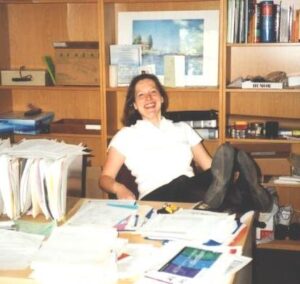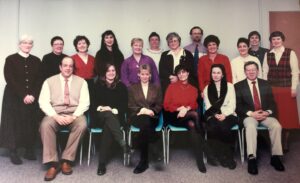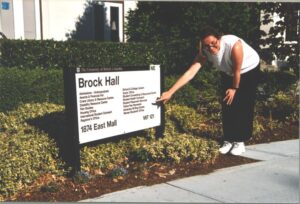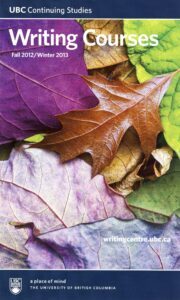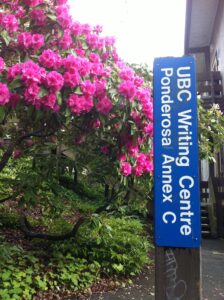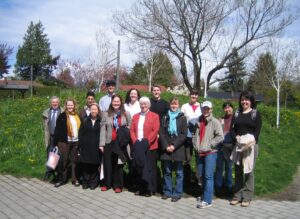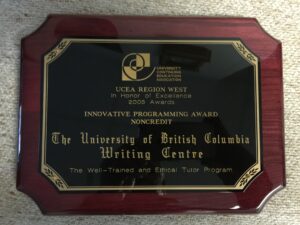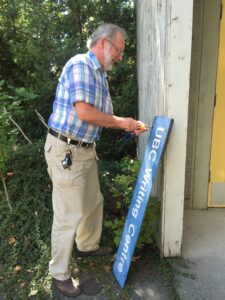Throughout the 1980s, the English Department debated the issue of writing instruction. Should the Department’s resources be drawn upon to teach basic composition? Shouldn’t the focus be on literature and advanced language study? Should writing instruction be included at all? In those days the first-year program was represented entirely by English 100, a six-credit course in literature and composition that had been required of all UBC students since UBC’s earliest days. Despite periodic attempts to update it in form and content, many faculty members in English felt that this monolithic course had now outgrown its usefulness. The issue was complicated by the fact that a growing number of first-year students had English as an additional language, and needed special assistance. Given budget cuts in the late eighties, and an increasing number of retirements, the Department was finding it harder and harder to meet all its commitments. Perhaps it was time, some argued, that basic composition should no longer be a burden carried by the English Department alone.
The matter came to a head during a departmental review in 1991. Though the idea of a writing centre separate from the English Department had been under consideration for several years, it was the review that provided the necessary impetus. The reviewers, spurred on by various department members who wanted to see changes to the English 100 course, recommended the establishment of a new first-year program that would do away with the traditional “lit-comp” combination of the old six-credit English 100 course in favour of a selection of one-term literature courses and a one-term composition course. All writing courses, it was proposed, should be taught outside the Department by a new academic unit that would focus entirely on writing, with a curriculum that would include the Department’s second-year credit courses in Intermediate Composition and Technical Writing. This unit would also develop new non-credit writing courses for students whose low Language Proficiency Index (LPI) marks would bar them from entry into any first-year English course. (The LPI was a province-wide composition examination administered at UBC, required of all entering first-year students.)
To help bring the new academic unit into existence the University formed an advisory committee comprising three members of Continuing Education (as it was then known): Carol Trepanier, Don Mosedale, and Janet Alexander, and three members of the English Department: Jane Flick, Judy Brown, and Tom Blom, the last-named acting as Chair.
From the outset, the Committee argued for a centre that would treat writing as a serious academic subject. In November 1991 it produced a report recommending the establishment of a writing centre that would not only deliver both credit and non-credit writing instruction at UBC, but also establish practica and internships for graduate students from a variety of disciplines, and attract funded research on pedagogy and the composing process. The Committee also proposed two new non-credit courses: English 098A, “Preparation for University Writing (English as an Additional Language)” and English 098B, “Preparation for University Writing (English as a First Language)”; the primary function of these two courses would be to help students meet the challenge of the LPI and gain access into first-year English.
The University acknowledged the excellence of the sub-committee’s report—but balked at the cost. Given the report’s tentative budget of between three and four hundred thousand dollars for a new centre, this wasn’t altogether surprising. Another bone of contention was the possible cost to students: to meet the expense of hiring additional instructors for the new centre, the administration proposed to charge enrollees double the usual amount for a three-credit course. Now it was the Committee’s turn to object. Discussion reached an impasse: the future of the new writing centre seemed in doubt.
At this point Herbert Rosengarten, then Head of the English Department, suggested a compromise solution: open the centre on an interim basis, restricting it to students needing remediation or second-language instruction—i.e., those students unable to access regular first-year English because of their low LPI scores; offer the non-credit writing courses 098A and 098B on a termly basis; and charge students approximately what they would have been charged for a term of first-year English.
The administration accepted this proposal, and in September 1992 the UBC Writing Skills Centre (as it was first called by Dean of Arts Patricia Marchak) opened its doors. Administrative responsibility for the Centre was initially shared by the English Department and Continuing Studies, the former undertaking the recruitment and hiring of instructors, the latter attending to logistics, such as finding a home for the Centre (described below). To help organize and administer the new courses, two co-coordinators were appointed: Ramona Montagnes and the late Ian Fairclough, both of whom were seasoned sessional lecturers in the English Department and very familiar with English 100 and the Department’s various writing courses. From the outset they introduced the spirit of commitment, teamwork, and professionalism that distinguished the Writing Centre throughout the period of its existence and ensured its continuing success.
Ian Fairclough and Ramona Montagnes, co-coordinators of the Writing Centre at its opening in 1992
In those early days Ramona and Ian were also fortunate to find themselves working with a group of experienced and dedicated colleagues: Sandra Bit (who also acted as coordinator, 1995-98), Joan Chard, Sybil Macmillan, Michelle Newcomb-Moon, and Eileen Taylor, all of whom played an important part in helping the Centre to become established and attain its goals. They were soon joined by other experienced teachers of writing, including Donna Schwartz, Michael Schoen, Julia Denholm, Alexandra Richmond, Susan Fisher, Roberta Birks, Wilma Armstrong, and Janice Pulley (winner of the 2016 UBC Continuing Studies John K. Friesen Excellence in Teaching Award).
Members and associates of the Writing Centre c.1998 (click to enlarge)
Back row: Judy Brown, Roberta Birks, Andrea Drysdale, Janice Pulley, Donna Schwartz, Wilma Armstrong, Sybil Macmillan, *Francis Andrew, *Judith Plessis, Sandra Bit, Eileen Conning, Joan Chard; front row: Michael Schoen, Stephanie Maricevic, *Eleonore Tremblay, *Chantal LeCorvec, Susan Fisher, Herbert Rosengarten. (An asterisk indicates a member of the Language Program.)
The Writing Centre’s first home was hardly conducive to learning or teaching: a couple of dingy and poorly-furnished rooms in the Auditorium Annex, opposite the Music School building. This was not so much a result of the struggle for space on campus as a reflection of the relatively low esteem in which the teaching of first-year composition was held across UBC.
Auditorium Annex, the Writing Centre’s first home.
It soon became apparent, however, that the new Centre could not function administratively or pedagogically in such restricted quarters, and thanks to a minor miracle, and the persistence of program directors Dr. Francis Andrew and Dr. Judith Plessis in Continuing Studies, in January 1993 the Centre was moved to a much more useable space on the second floor of Brock Hall, where the Centre’s small staff and the growing number of peer tutors could co-exist without encroaching on each other’s territory.
Ramona Montagnes pointing to proof of the Writing Centre’s existence in Brock Hall.
A final move occurred late in 1995, when the Centre was moved to what became its permanent home, Ponderosa Annex C, one of the low-cost semi-permanent buildings erected along West Mall in 1971-2 to replace the old army huts that had lined the road since the mid-40’s.
Ponderosa Annex C (UBC 1.1/12452-3)
At last the Writing Centre had its own home, complete with offices and classrooms, a kitchen, washrooms, and a small library—palatial quarters, even if turning on a heater would blow all the fuses in the building and the ground floor was a vacation resort for mice. The building was shared between the writing instructors and teachers in the Continuing Studies Language Program; on any given day the sounds of a class conjugating the French verb “avoir” might be heard mingling with the gentle tones of a patient tutor explaining for the tenth time that a subject must agree with its verb.
There were fears at first that students might not use the Centre; after all, its courses were not compulsory. Those fears proved groundless: in the first year of operation, 1992-93, approximately 500 students registered , and thirty sections of English 098A and 098B were needed to meet the demand. Subsequently, under Ramona Montagnes’s energetic and imaginative leadership, the Centre expanded to provide a variety of offerings, from courses on journal writing (Marlene Schiwy) to hands-on practice in restaurant reviewing and travel writing (Don Genova). Would-be freelancers benefited from the teaching of Jennifer Van Evra (winner of the 2013 John K. Friesen Excellence in Teaching Award); hopeful novelists sat in classes taught by Nancy Lee or Laisha Rosnau.
Instructors associated with the Writing Centre worked with the Faculties to devise discipline-oriented writing courses: Michael Schoen and Donna Schwartz in Applied Science, Amanda Goldrick-Jones in Forestry and the Sauder School of Business. A particularly valuable element of the Centre’s activities was the free tutoring service it provided to graduate and undergraduate students alike, staffed by teams of student instructors who were well coached by the indefatigable Judy Brown from English. Many of these peer tutors were English honours or majors students, but others were drawn from a variety of departments and Faculties, including Science.
A group of Writing Centre tutors with Judy Brown (centre) and Ramona Montagnes in 2007
By the time of its tenth anniversary in 2002, the Writing Centre had established itself as a vigorous and forward-looking branch of Continuing Studies, accommodating hundreds of students each year in over forty face-to-face and online non-credit courses. In August 2002, then-President Martha Piper wrote to compliment the Centre on its contribution to the improvement of student writing at UBC: “Our Writing Centre is to be congratulated for the part it has played in the promotion of good writing across the campus, and for the excellence of the service it has provided to our students over the last ten years.” That excellence was underlined a few years later, when the Centre was accorded recognition by the University Continuing Education Association for its innovative programming.
Award received by the Writing Centre in 2005
The quality of instruction and programming in the Centre was enhanced by the scholarly background of the instructional team. Some were editors or co-editors of university-level anthologies and reference books (the Canadian Writer’s Handbook, now in its fifth edition, was edited for Oxford University Press by a team including Judy Brown and Ramona Montagnes). A number presented regularly at conferences, like the annual conference of the Canadian Writing Centres Association, of which the UBC Writing Centre was a member. Several teachers were award-winning novelists and short-story writers (Lee Henderson, Nancy Lee, Karen Tulchinsky, Laisha Rosnau). Some, like Don Genova and Jennifer van Evra, made their living through their writing, and their students had the benefit of exposure to writing and publication at a professional level. Amanda Goldrick-Jones had chaired the Centre for Academic Writing at the University of Winnipeg before returning to Vancouver and UBC. And Judy Brown was a 3M National Teaching Fellow, one of perhaps 20 across UBC over the last three decades.
To maintain its consistently high standards the Centre depended not only on its teaching staff, but also on a long-serving group of administrative staff members, including Andrea Drysdale, Tea Inkinen, Vera Lowe, Conchita Suarez, and Stephanie Maricevic. (The last-named, a published poet, went on to teach literature in the Centre.) All worked closely with instructors and peer tutors to create a warm and friendly climate that embraced teachers and students alike through Christmas and birthday parties, as well as helping with an annual book-sale to raise money for tutor awards, or carving pumpkins at Hallowe’en. At its peak, the Centre generated a real sense of community that embraced students, staff, and instructors and radiated a spirit of welcome to all (except, perhaps, to the raccoons and squirrels that occasionally invaded the building).
The Writing Centre Book Sale held annually in Ponderosa Annex C
Over the 23 years of its existence, despite changes in programs and personnel, the principles informing the Centre’s activities remained consistent: to help students attain the standards necessary for admission into first-year English; to encourage writers both inside and outside the University to meet their personal and professional goals by learning to communicate clearly and effectively; and to accomplish this with teachers who believed in the importance of what they were doing and who cared passionately about improving the quality of writing at UBC and creating communities of practice both inside and outside the University.
Sadly, such lofty aspirations were not enough to save the Centre from the fate of many other non-credit units that fell prey to a sweeping revision of the Continuing Studies mandate. In 2015 the division shifted direction and title, becoming UBC Extended Learning, with a new emphasis on career, personal, and professional education. Continuing education at UBC had begun as a bridge between the University and the external community, emphasizing lifelong learning as a means to self-betterment and good citizenship; in recent years, however, the combination of financial pressures and market demand led administrators to conclude that the old model should give way to courses and programs that they hoped would contribute more substantially to the bottom line.
This is not the first time extension programs at UBC have been impacted by funding problems beyond their control, and we can anticipate with some confidence that they will continue and regain their strength. But the loss of the Writing Centre is a self-inflicted wound that may take a long time to heal.
Francis Andrew rescuing the Writing Centre sign after the Centre’s demise in 2015
NB: Recently a “Centre for Writing and Scholarly Communication” opened in the Barber Learning Centre Learning Commons, where peer writing consultants offer writing support for students at all levels, and in the fall of 2019 the service was extended to UBC’s new Library Research Commons in the Koerner Library (https://researchcommons.library.ubc.ca/).

